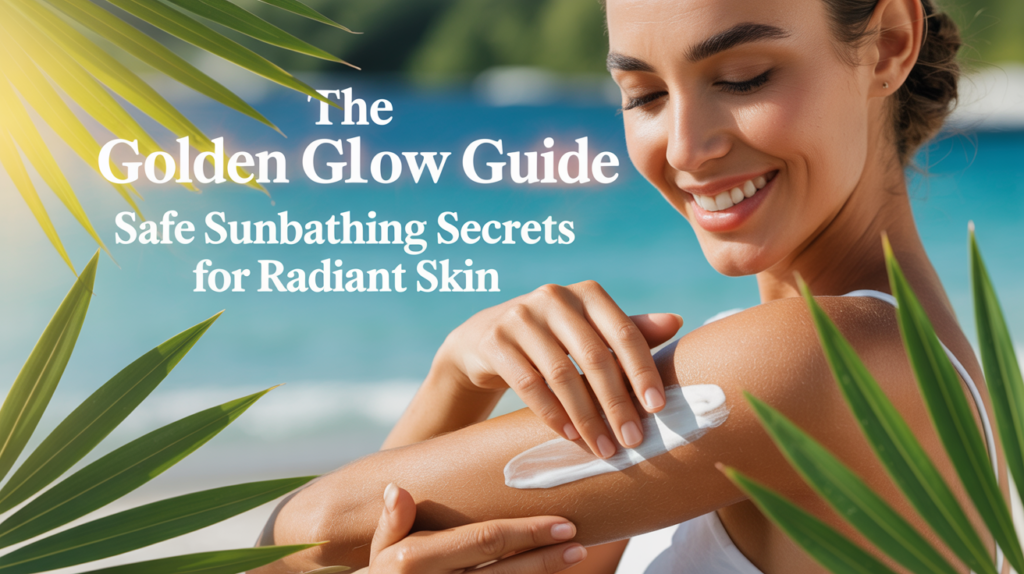Natural sunlight is very important for our body it provides not only vitamin D to the body but is also very beneficial for skin health. If sunbathing is done with proper caution, it can be helpful in making the skin glow, transparent and healthy. However, sitting in the sun too much and carelessly can also be harmful to our skin.
In this article, we will provide you very effective tips for sunbathing that not only brighten the skin but also protect it from skin diseases.
- Choose the right time to sunbathe
UVB rays in sunlight help the skin produce vitamin D, but too much of these rays can also be harmful. Therefore, the best time to sunbathe is Between 7 am and 10 am or After 4 pm
These times are considered safe because the sun’s rays are softer during these times.
- Limit the duration for sunbathing
It is very important to limit the time you sunbathe. Sitting in the sun for too long:
- The skin can burn
- Dryness or allergies can occur
- Wrinkles or spots can form on the skin
Initially, sunbathing for 10 to 15 minutes every day is enough. The time can be gradually increased, but do not exceed 30 minutes.
- Prepare your skin for the sun
Cleansing your skin before sunbathing is very important. You should:
Wash your skin with a mild face wash
Remove excess oil or makeup
Do not use any moisturizer or lotion that may react in the sun
Sunlight affects clean skin effectively.
- Wear appropriate clothing
If you are only exposing your face or arms to the sun, cover the other parts with clothes to protect your skin from additional UV rays.
- Use light and soft clothing
- Wear sunglasses for your eyes
- Wear a light hat on your head
- All these things help protect your skin.
- Use sunscreen (if the time is long)
If you are sunbathing for more than 15 minutes or your skin is very sensitive, use a sunscreen with at least SPF 30 Sunscreen:
- Protects the skin from burning
- Reduces sun damage
- Protects against wrinkles and dark spots
- Apply sunscreen 20 minutes before sunbathing.
- Increase water intake
Sitting in the sun can cause dehydration in the body and skin, therefore:
It is important to drink water before and after sunbathing
Splashing a little water on the face also provides refreshment
Coconut water or lemon water is also beneficial
Hydrated skin is always more radiant and healthy.
- Skin care after sunbathing
It is important to take proper care of the skin after sunbathing:
- Wash the skin with cold water
- Apply aloe Vera gel or a specific moisturizer after sunbathing
- If there is irritation or redness on the skin, consult a doctor immediately
After sunbathing care provides cooling and moisture to the skin.
- How many times a week should you sunbathe?
According to experts:
- 3 to 4 days a week is enough to sunbathe.
- In winter, sunlight is softer, so a little more time can be taken.
- Caution is necessary in summer because the sun’s heat is high.
- Sunbathing and Vitamin D
Taking sunbaths naturally produces vitamin D in the body, which:
- Is useful for strengthening bones
- Improves the immune system
- Reduces stress
Natural sunlight is an excellent medicine for people with vitamin D deficiency.
- Who should avoid sunbathing?
If you have the following problems, be sure to consult a doctor before taking a sunbath:
- Skin allergies
- Acne or sensitive skin
- Skin diseases such as eczema or psoriasis
- Blisters or spots on the skin
People with sensitive skin need to be more careful.
| Effect Type | Impact | Description | Stat/Fact |
| Positive | Boosts Vitamin D Production | Sunlight stimulates vitamin D synthesis, vital for bones and immunity | 15–30 mins of sun/day gives 90–100% of daily Vitamin D |
| Positive | Improves Mood | Exposure to sunlight boosts serotonin levels, reducing stress and anxiety | Sunlight boosts mood by up to 60%, studies suggest |
| Positive | Supports Skin Conditions | Helps in treating acne, psoriasis, and eczema in some individuals | 30% of eczema patients benefit from controlled sun exposure |
| Positive | Strengthens Bones | Vitamin D improves calcium absorption, crucial for bone density | 1 in 3 women over 50 suffer bone loss due to low vitamin D |
| Positive | Regulates Sleep-Wake Cycle | Sunlight helps regulate melatonin production, aiding sleep patterns | Morning sunlight boosts melatonin production at night |
| Negative | Risk of Sunburn | Overexposure damages skin layers, causing burns | Over 33% of adults report sunburn at least once a year |
| Negative | Premature Skin Aging | UV rays break down collagen, leading to wrinkles and fine lines | 80% of visible aging is due to UV exposure |
| Negative | Skin Cancer Risk | Prolonged UV exposure is a major cause of skin cancer | 1 in 5 Americans develop skin cancer by age 70 |
| Negative | Eye Damage | UV rays can harm the eyes, leading to cataracts or macular degeneration | UV exposure increases cataract risk by 60% |
| Negative | Dehydration | Long sun exposure causes water loss through sweat | Body loses 1–2 liters of water per hour under strong sun |
Conclusion: Natural light for a natural glow
Taking sunbaths is a simple but effective way to keep the skin glowing, healthy and fresh. If you follow the right timing, precautions, and after-sun care, this practice is beneficial not only for your skin but also for your overall health.
Remember: Not too much, just the right amount of sunlight to keep your skin glowing without burning.

